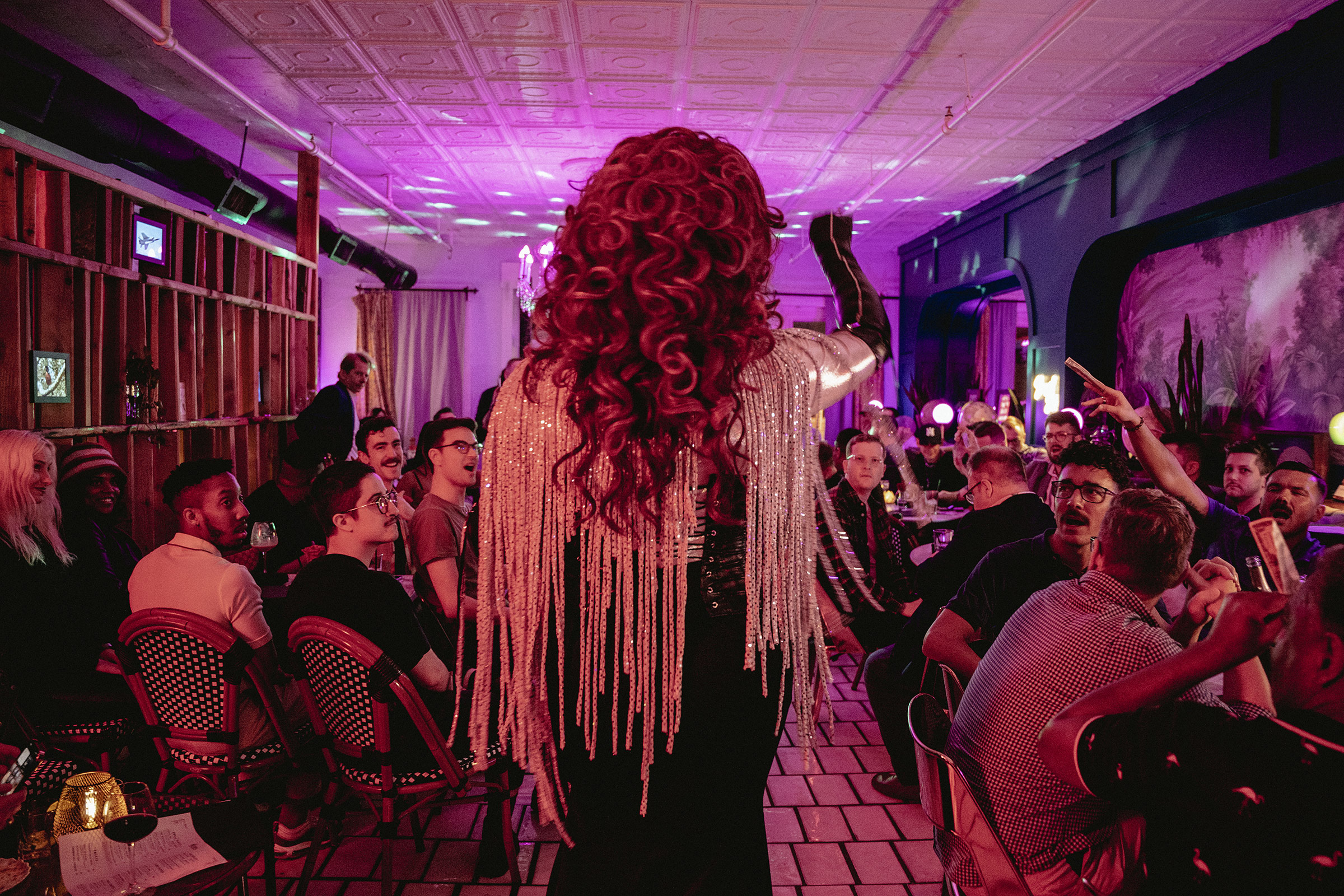Keleigh Klarke is wearing royal blue.
It’s a snug, fishtailed, floor-length gown with cascading layers of electric-blue ruffles at Klarke’s shoulders, with just enough of a train and sequins to serve some drama. But that’s not what seems to draw some of the crowd to stand inches from the stage. Nor is it her blonde wig with dark roots, hot-curled and hair-sprayed to stay closer to heaven, or her bejeweled fingers.
The audience members stand to offer tribute to the performer sometimes known as the Diamond Doll. It’s a Saturday in mid-March, about a half hour before midnight, and inside the confines of Dru’s Bar, a gay pub open under different names since the late 1960s. The Boom Boom Effect drag show is well under way.
But where other performers have shimmied, Klarke steps forward, then back. In the very spot where another performer will land a kick split and backbend in a leotard and over-the-knee boots, Klarke stands like a queen, back straight, head high, heels and toes together just the way somebody’s Southern grandmother would advise. When Klarke accepts a patron’s dollar, she grasps their hand. She makes eye contact. She leaves the sense that the donor has had a moment in the sun.
More from TIME
So it’s also, in a way, jarring that Klarke is lip-syncing a rendition of 4 Non Blondes’ “What’s Up?,” a song about an uneasy sense of concurrent crisis and surface calm.
For Klarke, a Memphis drag queen approaching her 22nd year on the stage, it is a strange and unsettling moment. It’s been just over a fortnight since Tennessee lawmakers, a legislature dominated by white male Republican boomers, passed a first-in-the-nation law regulating drag performances. The legislation, which was supposed to go into effect on April 1 but was temporarily blocked on March 31 by a federal judge, creates “an offense for a person who engages in an adult cabaret performance on public property or in a location where the adult cabaret performance could be viewed by a person who is not an adult.” It applies to “topless dancers, go-go dancers, exotic dancers, strippers, male or female impersonators who provide entertainment that appeals to a prurient interest.” But while supporters cite a need to protect children from what they describe as a sexualized threat, opponents worry the policy will unleash a new era of monitoring, with prosecutorial and police discretion reminiscent of a time when homosexuality and many acts of gender nonconformity were considered criminal. This week, a trial on the law’s constitutionality was set for May 22.
Read More: You Don’t Silence a Drag Queen
Even if none of the formal weight of the law is brought to bear on Tennessee’s drag performers, some critics warn that the very possibility could stifle expression and dampen a legitimate art form. The law is just one of a number of bills restricting drag performance in the U.S. and part of a broader collection of 470 bills introduced by lawmakers intent on targeting LGBTQ people, according to the Human Rights Campaign. And it’s connected, critics contend, to an effort to roll back the clock on social acceptance and real access to the full range of rights for LGBTQ people.
That this is happening here is, in many ways, surprising. This, after all, is Memphis, a city that birthed and sustained its own branch of the blues. This is Memphis where Elvis Presley, native of Tupelo, Miss., arrived an economic refugee and died a beleaguered and challenged King. And this is Memphis, Tennessee’s largest metro area, to which people fleeing the rigors of überconservative culture and the confines of middle American economies continue to stream. Klarke is one of them.
“Hey, I’ve made a pretty successful career out of walking around in four-inch heels,” Klarke, 43, says. “This is a part of who I am. I entertain. Those lawmakers in Nashville are not going to stop me from making people happy.”
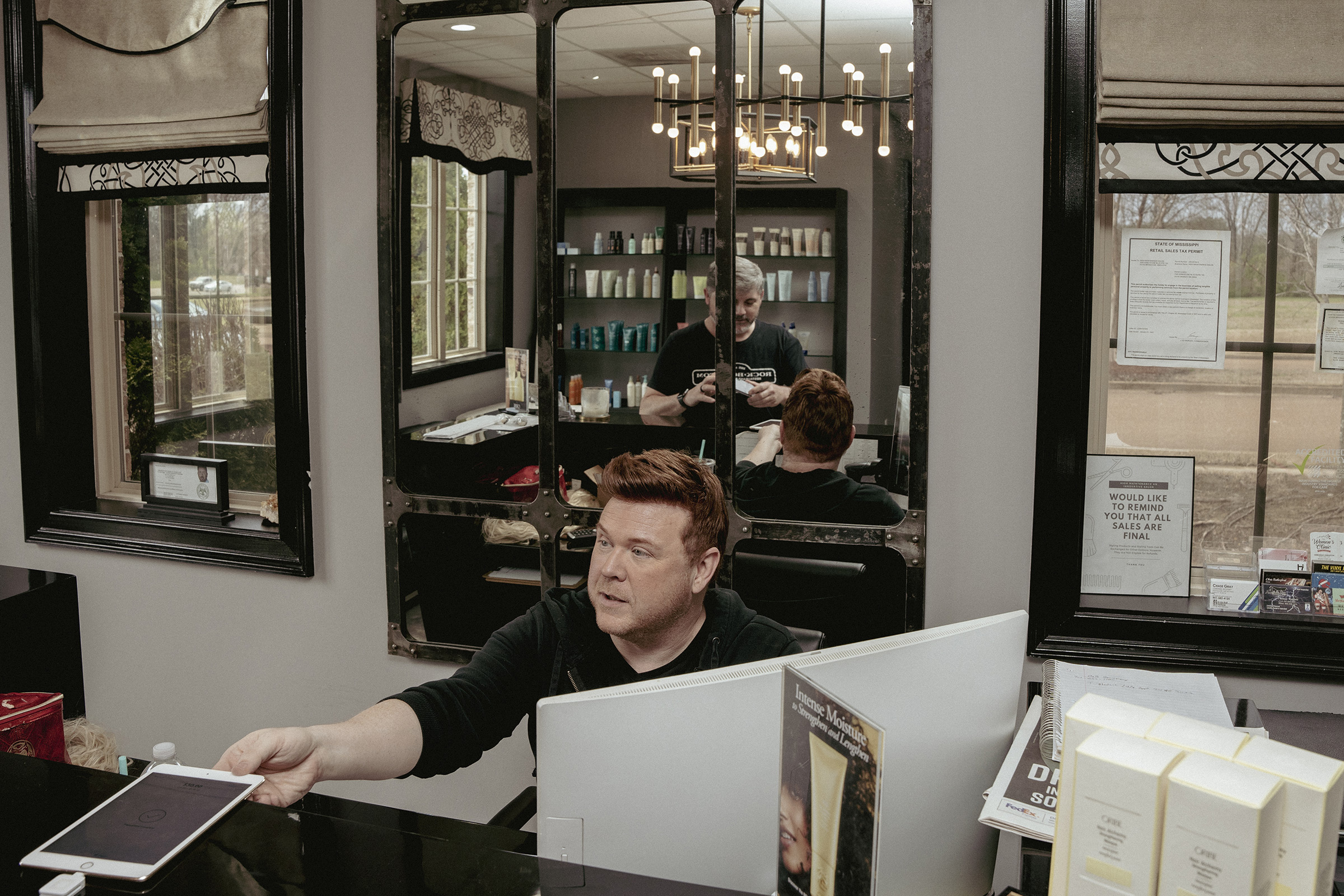
Klarke, who offstage answers to the name his parents gave him, Kelly McDaniel, was born a decade after Stonewall, the catalytic raids and resistance behind the American gay-rights movement. Part of a rodeo family in New Boston, Texas, McDaniel saw cousins become world-champion bullfighters and his brother a serious competitor. That too is spectacle, sport, and performance, he says. So those are things McDaniel, reserved and socially anxious away from the spotlight, has long understood. McDaniel rode competitively, but rodeo wasn’t his thing. In a covert way, Barbies and makeup were, Klarke explained in an October episode of her podcast Around the Pink Table. Little Kelly wasn’t allowed an actual Barbie but was given coloring books by the multipack, which always included a few that were Barbie-themed. There he’d color in just the shoes, the fingernails, and the lips. His parents moved to Memphis while McDaniel was in college, and in 2000, he followed. Later that year, when he turned 21, McDaniel told his family he is gay. (TIME has used the performers’ preferred pronouns in and out of drag throughout this story.)
“My family struggled a little bit when I first came out,” McDaniel says, “but then after about a year, they came around. I never had to, like, really hide who I was.”
In Memphis he saw what he considers his first “actual drag show,” and thought, “I don’t know how, but I’ve got to do that.”
In late 2001 after doing a few amateur appearances, McDaniel, or rather the stage persona he developed, Keleigh Klarke—inspired by the sometimes villainous, always glamorous boss lady of Dynasty, Joan Collins—performed for the first time.
“I enjoy aspects of the grandiosity of the ʼ80s,” McDaniel says. “Who wouldn’t want to look like that?” Klarke is, McDaniel says, “just me, elevated.”
McDaniel’s dad never made it to one of his shows before he died in 2013, but his mother, who has since returned to Texas, has seen him perform twice. “You know how any parent is. She told me the next day, ‘Well, I really enjoyed the show. And everybody was really good and everybody looks great. But, you know, you were better than everybody else ” McDaniel says about his mother who, when he was a child, so enjoyed watching all the big pageants with him that the two would try to calculate contestant scores.
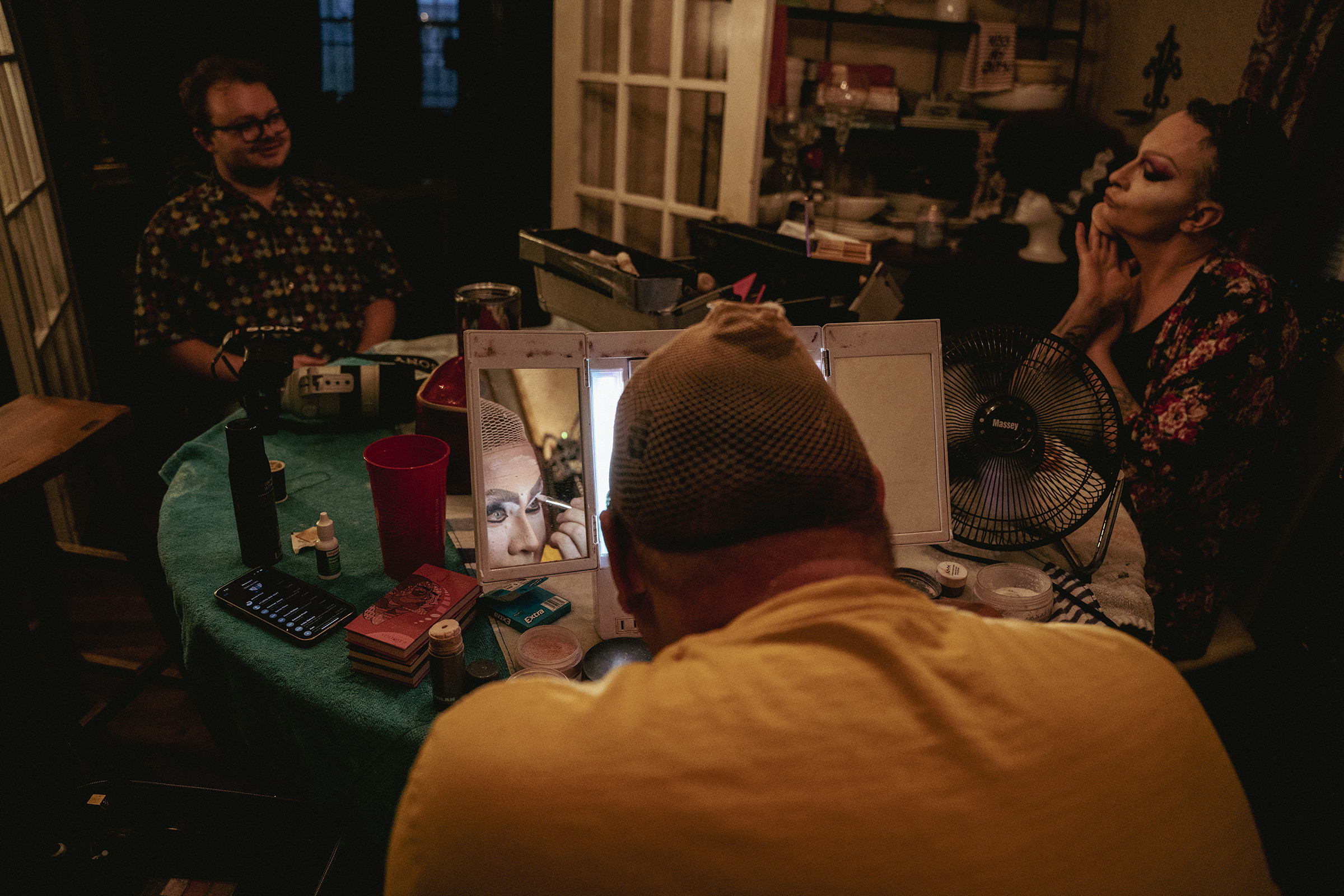
Klarke is a “classic” or “pageant” queen—big hair, sequins, and gowns. That was the style when she first took the stage. Today there are also alternative or goth queens, some of whom don’t wear forms to create breast shapes, and there are camp queens, with extravagant costumes, sometimes in neon colors, and characters created from the performer’s imagination or a mash-up of real people and fictional characters. These are distinctions millions of people know at least a little something about. Television shows such as RuPaul’s Drag Race (and its numerous spin-offs), We’re Here, and Legendary air on cable networks and streaming services, facilitating a broader understanding of drag performance, voguing competitions, and the lingo of the community.
More than two decades after his stage debut, I meet McDaniel—who worked all day at a salon where he is the manager—in a dressing room cluttered with bits of stage wear: an ombre purple mohawk wig on a styrofoam head, metallic-green platform pumps, a sequined cummerbund. It’s about 4½ hours until showtime and he is engaged in his favorite part of the art form: “getting into drag.”
McDaniel has already applied base makeup from his upper chest to his hairline, creating a palette where, for the moment, everything appears monochrome except his robin’s-egg-blue eyes. To his left is what looks like a soft-sided, double-depth briefcase. Inside is the most impressive collection of makeup brushes I have ever seen. There’s room for McDaniel’s powders, highlighters, a contour stick and compacts, at least four eyeshadow palettes, liners, lipsticks, eyelashes, glue, mascaras, and other tools. When another performer, Luna Luella, admits there’s a card edge involved in the way they apply eyeshadow, McDaniel, who likes it bold and freehand, weighs in.
He’s not into the subtle no-makeup makeup thing. His late drag mother—a term of honor and address performers use to describe an established queen who mentors newbies in the art form, offers support, and helps those who have issues with their families connect with housing and jobs—shamed him out of relying on the card trick the way math teachers once railed against overreliance on calculators.
McDaniel can get into drag in an hour and a half, but he prefers to take his time. So, he almost always arrives by 5:30 p.m. for a 10 p.m. show. Both performers are adding color to their faces as we talk.
When I ask McDaniel if the legislation looms in a way that affects the show or how he performs, he says no, pretty emphatically.
Luella agrees. They came to Memphis from a small town in Mississippi, where they went to a small, Christian private school, entirely white. Most of their childhood they did not know anyone gay, though they say they knew they were gay since they were a child. Now that they are an adult, Luella is also the star of some very wholesome Memphis drag infamy. At the height of the pandemic, Dru’s drag shows continued remotely. During one of Luella’s performances, their wig caught a ceiling-fan string, left their head, and proceeded to spin. The incident was so funny, people continue to allude to fans and wigs in flight whenever Luella is around. But Luella is also kind of proud.
A man who was watching that night at home told them he’d been contemplating suicide. The flying wig made him laugh so hard he decided there may be things left in this world worth seeing.
“So that’s what I did during the lockdown,” Luella says. “My wig flew off, spun all around, and saved somebody’s life. This drag queen, right here. I didn’t see any politicians offering anybody comfort.”
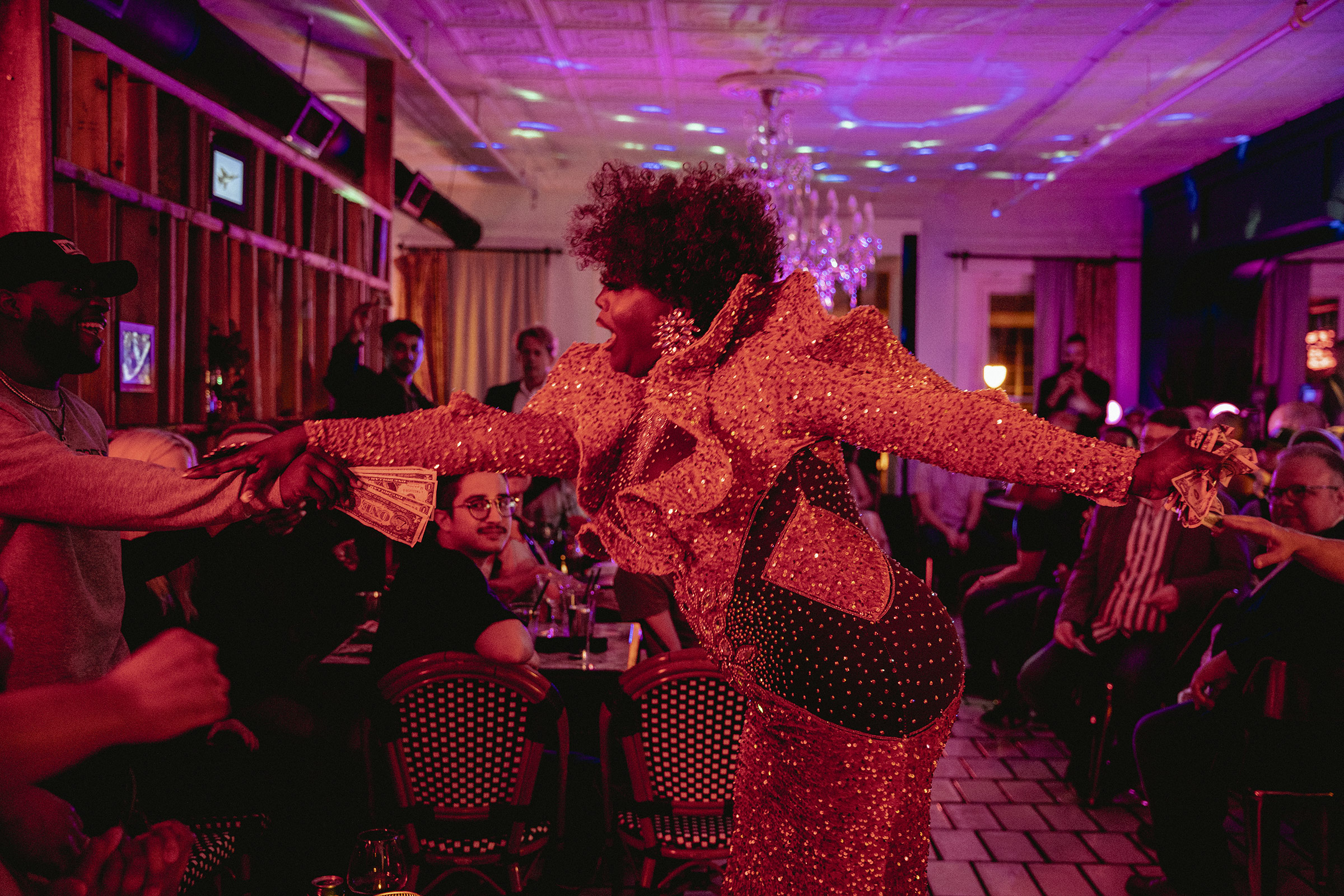
In the weeks since the Tennessee’s legislature began to debate the drag bill, every drag show at Dru’s, where McDaniel also serves as the entertainment director, has begun with what the performers call a statement piece.
Tonight’s show starts with a three-performer number. Luella and Jr Stone, a male performer, join a drag queen using the stage name Freak Nasty in a lip-synced rendition of Michael Jackson’s “They Don’t Care About Us.” There’s a display of the trans and LGBTQ pride flags, a series of formations, and in the finale, each performer holds a white sign with black lettering: “I Will Not Be Silent,” “This Is Me,” and “F-ck This Bill.”
Memphis was once home to as many as 10 gay clubs, places where as recently as the 1990s, I’m told, some people had the undignified experience of having to enter by climbing a back wall. Today, there are only about three. I ask McDaniel why.
“The glory days of the gay bar are behind it,” he says, then pauses. “Do you really want to know what I think?”
“Yes.”
“Equality,” McDaniel says.
Read More: Florida Set to Dramatically Expand Its ‘Don’t Say Gay’ Laws. Here’s What They Will Do
In short, as social acceptance of LGBTQ people and elements of what McDaniel calls gay culture grew, the option to grab a drink, hold hands, kiss, or dance with whomever one wants expanded to most clubs in most major cities. In recent years, what McDaniel calls “mainstream” restaurants have begun hosting drag bingos and brunches. So activities that once helped keep the lights on at LGBTQ clubs are available in many places. Now, though, some of those businesses are shutting the shows down.
Already, two Memphis restaurants operating drag brunches had indicated that they would stop come April 1. A few weeks before a court temporarily blocked the law, three Memphis drag performers told me that drag brunch at Hard Rock Cafe on Beale Street would end too. “Hard Rock Cafe Memphis intends to be fully compliant with this law when it becomes effective,” an emailed statement from Hard Rock International reads.
“For all these large corporations that every year, in June, tweet their Pride-friendly announcements, this is their chance to step up and show more solidarity with the community,” says Cookie Woolner, a professor specializing in queer history at the University of Memphis. “I think there are a lot of people asking where they are.”
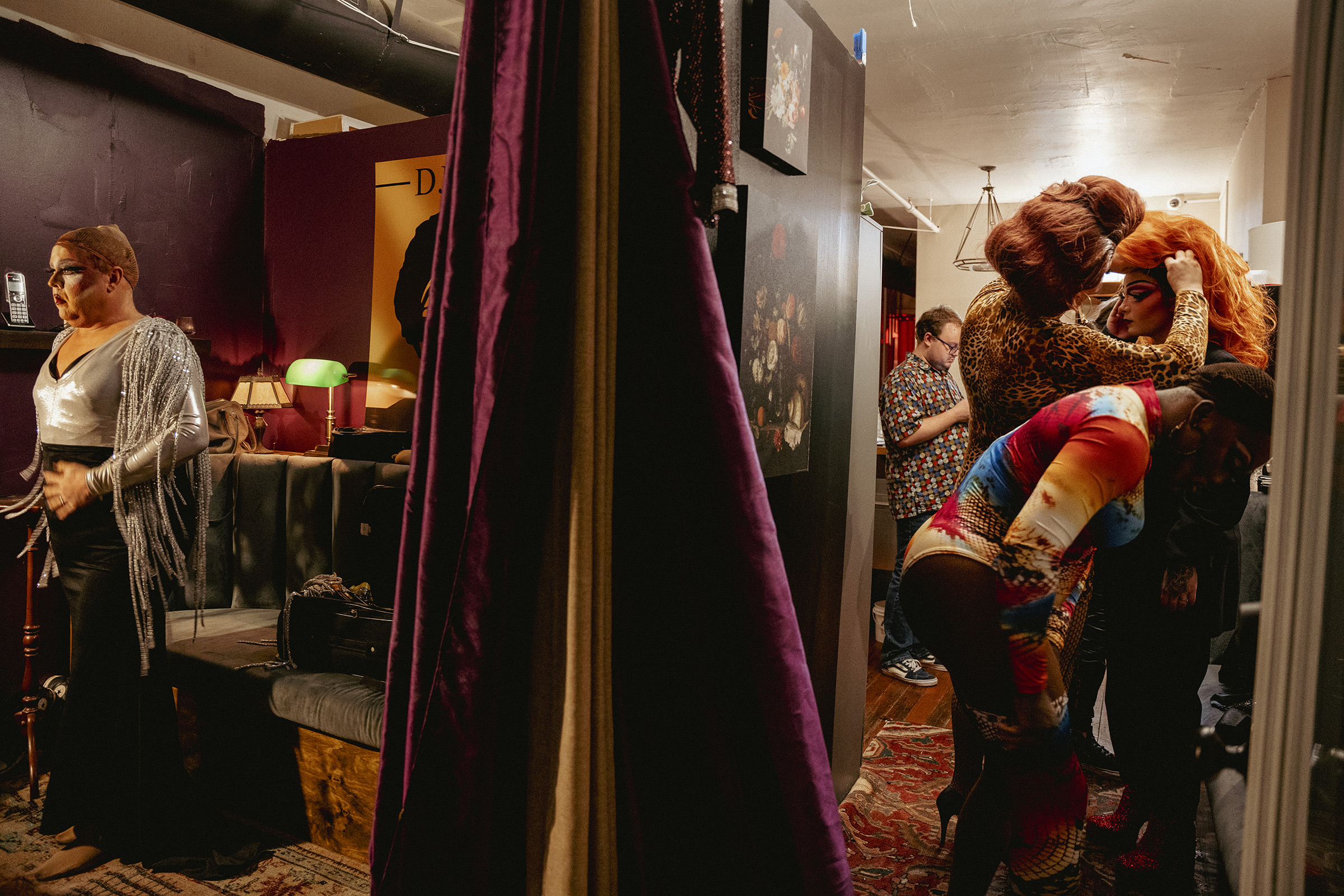
Tennessee senate majority leader Jack Johnson, a Republican from a conservative and wealthy section of suburban Nashville that’s occupied headlines because of vicious disagreements over masks and book bans and the chief senate sponsor of the drag bill, has insisted that the legislation does not ban drag. The word isn’t used in the bill. Instead, he’s said, it ensures that parents won’t take their kids to a show and “be blindsided by a sexualized performance.” Many performers say the law’s supporters either misunderstand or intentionally mischaracterize the art form. Johnson declined to speak with TIME, directing me to the text of the bill.
Read it and things still aren’t exactly clear.
“The law itself only truly regulates sexual performances that are criminally obscene for minors,” says Stella Yarbrough, legal director at the ACLU of Tennessee, “of no artistic value, overtly sexual, only appeal to the prurient interest—which is a shameful or morbid interest in sex—and is patently offensive. And that to me does not apply to 99.9% of drag performances.”
But Yarbrough concedes that law enforcement may interpret it differently. Just the possibility of running afoul of the law—a first violation would lead to misdemeanor charges and a subsequent one, a felony—may have a chilling effect.
“The confusion is the point,” Yarbrough says.
McDaniel performs in spaces open only to those 18 and up, but he and his friends have contemplated how the law may be applied: Would a trans woman sitting at a traffic light who decides to sing along with the radio violate the law if a child is in the next car? What if a drag performer headed to the bus stop dances to music on their headphones? Is that a performance?
“I don’t want to dismiss those very real fears,” Yarborough says, “because those fears are based not just on the text of the law but the comments the legislators made themselves when they were on the floor passing this bill, which is that this was to target drag performances, male and female impersonators. So that is totally rational and valid.”
The law has been described as anti-gay or anti-trans, says Robert Post, a First Amendment scholar at Yale Law School, but it’s structured as an anti-sexual-performance bill. Courts have recognized some public interest in regulating sexual performances, he says, but he predicted that Tennessee would have a hard time defining the concept of a “male or female impersonator,” and equating that to an inherently sexual performance.
“That cannot mean just a man ‘dressing like a woman,’ or a ‘woman dressing like a man,’” he says. “So much classic theater, like half of Shakespeare, are like that. No court is going to say the state can ban performing Twelfth Night. That’s not going to be a serious position.”
On March 27, Friends of George’s, a drag theater troupe in Memphis, challenged the law in federal court on the grounds that all drag performances cannot be classified as “adult cabaret shows,” the law infringes on the performers’ First Amendment rights, it’s both excessively broad and unclear allowing for wild differences in enforcement, and it infringes on the way that parents may guide their own children. Hours before the law would have gone into effect, U.S. District Court Judge Thomas L. Parker issued a temporary injunction, halting it for 14 days and citing a concern that the legislation might violate the plaintiff’s freedom of speech. On April 5, he extended the order until the trial at the end of next month.
To McDaniel, lawmakers engaged in a sleight of hand, hoping the public will be distracted by “the sequins and the feathers, the tales of sashaying men in dresses,” and fail to notice an absence of action on other things. There’s crime and public safety, school funding, public health, the notoriously poor state of children in state custody, wages, and other social and economic conditions across the state.
“They don’t seem to have solutions, real answers,” McDaniel says. “Just feelings and fears.”
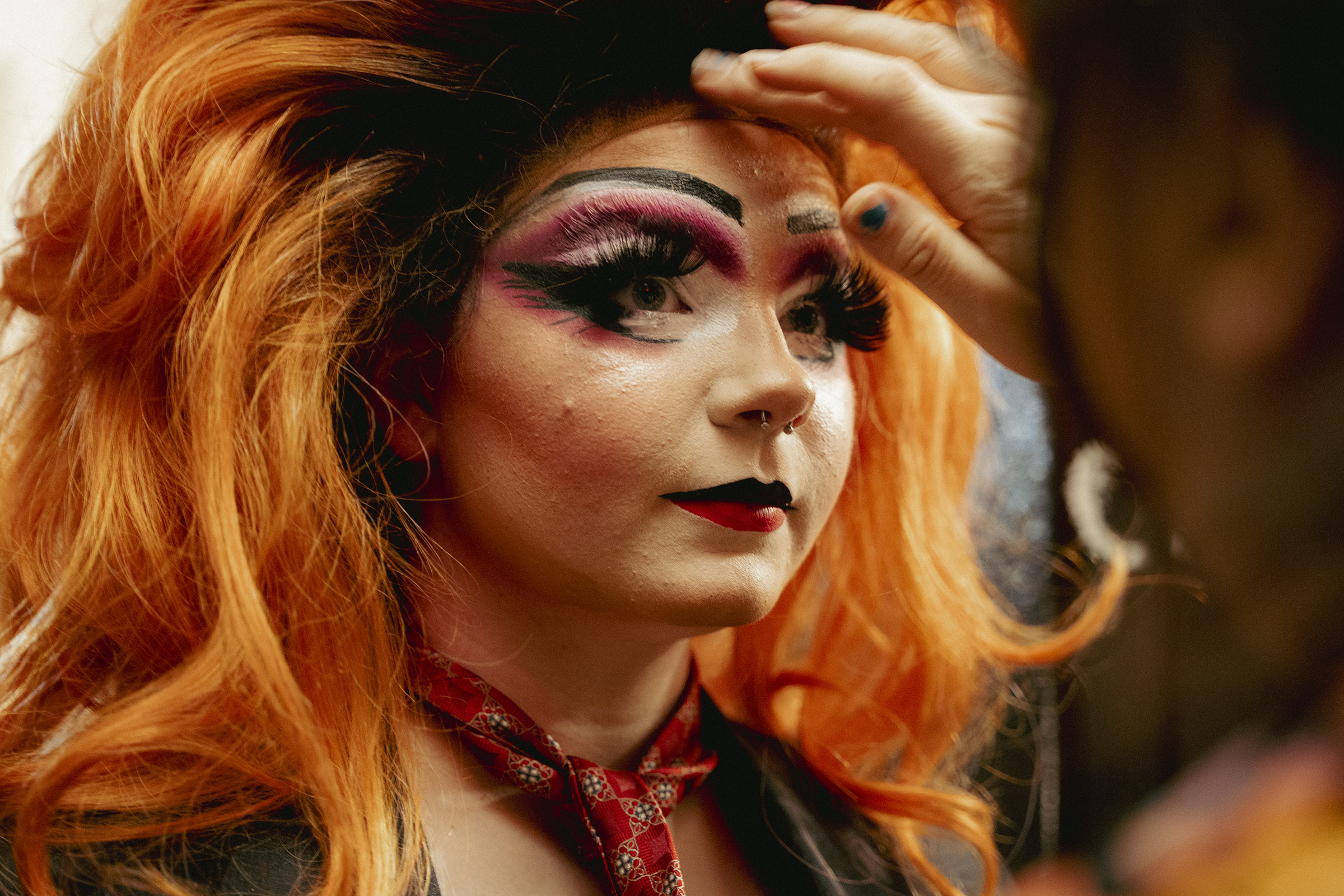
The Sunday morning after The Boom Boom Effect, I meet McDaniel and his husband Austin Wood-McDaniel, 26, for brunch at IBIS, one of a few locations that, like Dru’s, had planned to continue drag performances after April 1. McDaniel and Wood-McDaniel are seated on the same side of a velvet-covered booth, hands on one another’s thighs.
McDaniel is in recovery mode. Hours in high heels, heavy makeup, weighty jewelry, and moving in a way large enough to fill up a stage leaves him with sore knees and ankles, sometimes back pain, dry eyes, and earlobe abrasions. There’s only one way to keep bread-plate-size earrings on earlobes: glue. When a performer pulls them off at the end of the night, sometimes a little skin comes too.
McDaniel, who has scaled back how often he performs, is reminded all the time that he’s becoming a more seasoned member of the drag community. Lots of young people in Memphis use the term “queer” as their preferred umbrella term for people who identify as LGBTQ. But for McDaniel, there’s trauma associated with the word. Growing up, that’s what bullies called him. He’s also learning more about nonbinary people. When he came out, people were who they were. But a friend pointed out something that’s made him think: The option to define one’s gender identity didn’t exist in a broad way when they were in their teens and 20s. How, then, does McDaniel know what he would do now?
There’s also the difference in the way he and his husband think about personal security. When performing downtown where parking is scarce, Wood-McDaniel—who performs in drag under the name Wednesday Moss, an homage to Wednesday Addams and Kate Moss—often dresses at home, parks wherever he can, and walks to his destination in drag. Memphis is generally open-minded, McDaniel says. But it also has a lot of tourist traffic. Now, McDaniel thinks it’s a good time to double down on precautions: Park close to the venue. When possible, dress on site and don’t go alone. Despite this, McDaniel says he’s not rattled by the law and the climate it may create. He never thought that all the progress was quite as expansive or real as it seemed. But, he says, there have been moments, at home alone, where he’s wondered if he’s in shock. It’s staggering how swiftly the landscape has moved.
At Dru’s, since the shooting at a gay club in Colorado Springs last November, the show’s opening announcement has included some tongue-in-cheek references that tell the audience where all the exits are in case of emergency. One “is near the spotlight, which someone will probably try to steal.” Another is behind the stage, “a back door, which some of you know a lot about.” In 2021, the most recent year for which FBI data is available, there were 13 anti-LGBTQ hate crimes in Tennessee.
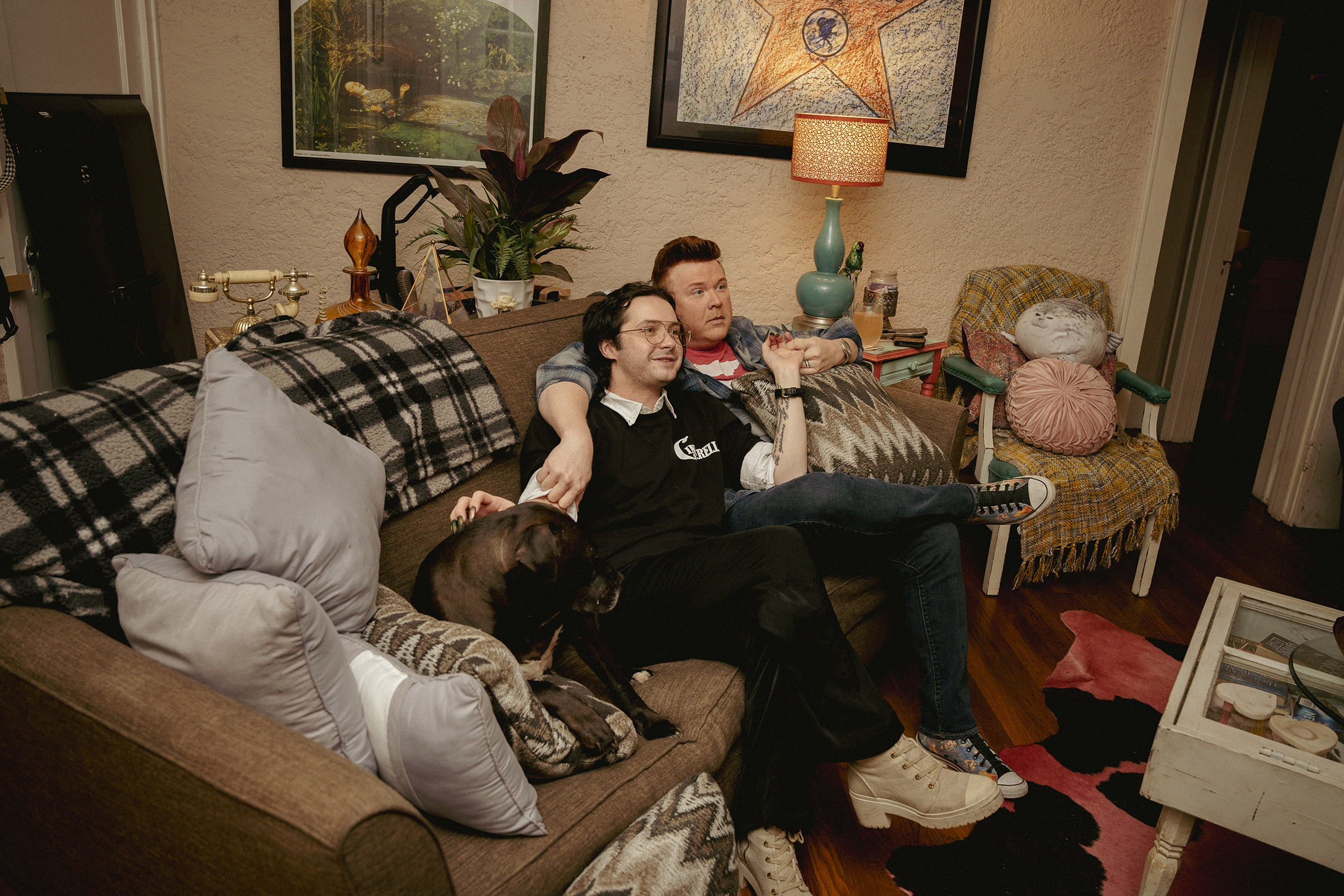
McDaniel and Wood-McDaniel met right before the pandemic in 2020. Late last year when they were planning their wedding, they found themselves living in a country in which a member of the Supreme Court had recently suggested that the legal basis of same-sex marriage was not sound, prompting a conversation about a possible federal law to protect it and chatter in Tennessee among those who felt it was the religious liberty to object that needed a shield. Then, it was Wood-McDaniel who was uneasy. He wanted to go to the courthouse right away. Almost all of his adult life, gay marriage has been legal. When Obergefell v. Hodges was decided in 2015, a case where the Supreme Court ruled that the right to marry is also guaranteed to same-sex couples, Wood-McDaniel was 19. He remembers the Obama White House lit up in rainbow colors. To McDaniel, there was life before gay marriage was legal and life would continue whether they could marry or not.
The two wed as planned in November. They wore matching bordeaux velvet jackets with black lapels and waistcoats. About a month later Congress passed the Respect for Marriage Act, protecting gay and interracial marriage. In March, the Tennessee house of representatives passed a bill allowing people not to solemnize a marriage to which they object. The Tennessee senate put it on hold until next year but should it pass, it could set up a legal clash between the state and federal governments.
Many members of Memphis’ LGBTQ community say they find several of the state’s recent moves concerning. Tennessee’s Republican governor Bill Lee rejected, earlier this year, federal funding for HIV testing and prevention programs. The state has banned gender-affirming medical care for minors. One pending bill could bar residents from changing the sex listed on their birth certificates or driver’s licenses, risking more than $1.2 billion in federal funds. Another passed the house but failed in the senate that would have required venues offering drag shows to obtain licenses for $500 and drag performers to obtain permits for $100, plus annual renewal fees.
“I’m a person who has not always felt qualified to comment publicly about things that are happening,” Wood-McDaniel says. “Now I feel that I have to.”
McDaniel is involved, in touch with what’s going on, active. He’s in close contact with the people planning Memphis’ Mid-South Pride and an upcoming outdoor movie and performance event called Drag N Drive. Memphis and surrounding Shelby County law enforcement officials have said they do not foresee making arrests related to the drag-performance restrictions at Memphis’ early June celebration, but Pride organizers have still made changes this year: they have banned on-site costume changes for drag performers and will require that tips be placed in buckets instead of the performers’ hands so there is no direct exchange of funds. That said, they have also expanded the number of drag performers to more than 40, a record for the local celebration. Right now, Memphis’s Pride celebration is the only one in the state where drag performances are scheduled. It’s a situation that has some drag performers feeling cast off or sacrificed by the broader LGBTQ population.
McDaniel spends a lot of time at Dru’s, where a wall outside reads, “More Than a Bar, It’s Your Bar.” There before every show there are so many community announcements on the overhead TV screens that one feels the need to get a pen: panel discussions, therapy offers, meet-ups to help people with aspects of transitioning, health care services, LGBTQ events, and menu specials. Most clearly indicate that they are for those 18 and up, and in several cases 21 and up. It gives me the sense that LGBTQ teens may feel stranded. But McDaniel tells me there are some services available to younger members of the community. The climate is one thing. But no one has forgotten what it is to be an LGBTQ teen in the South.
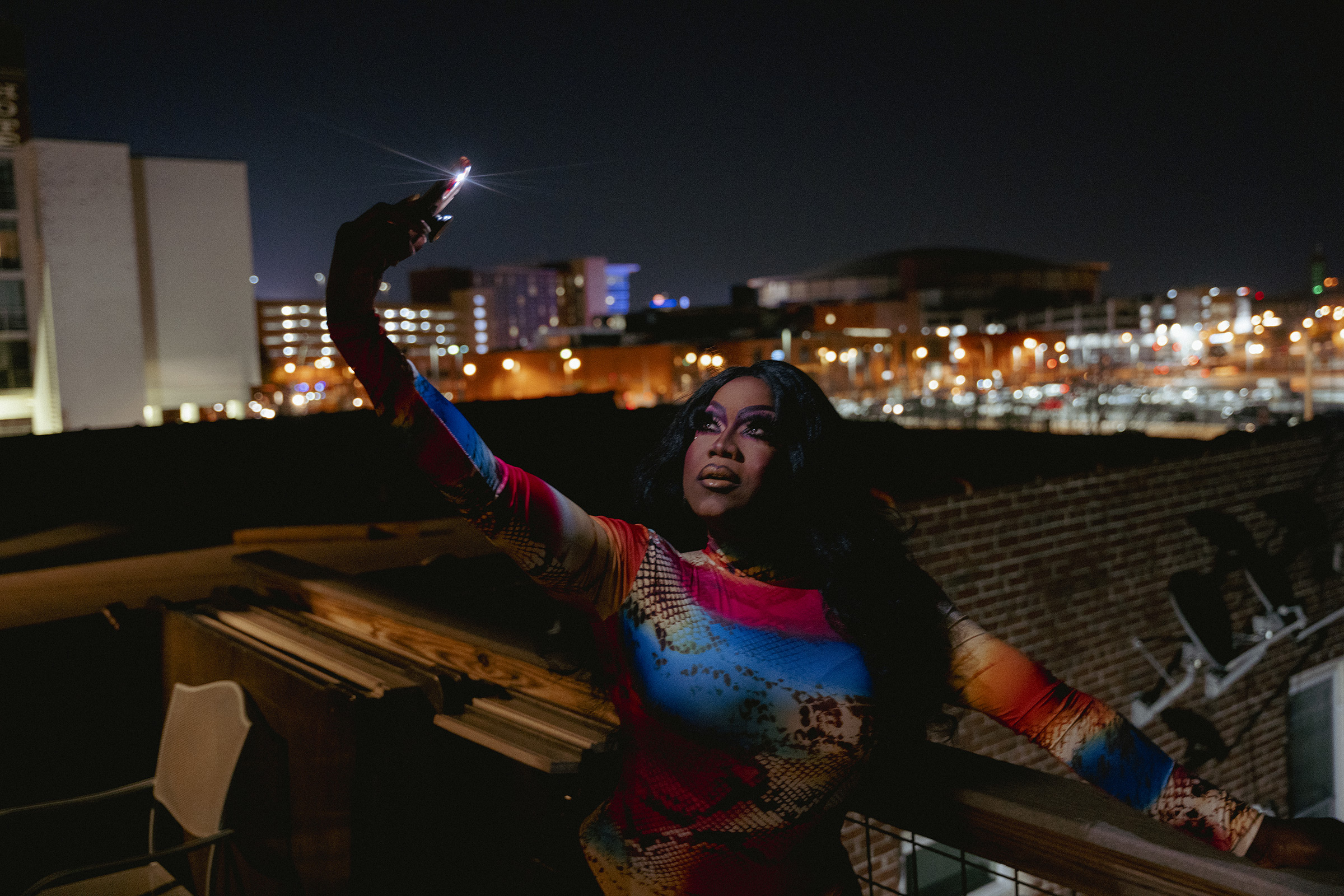
Amid the many conversations about what will happen when the law takes effect, there’s one question that rarely comes up: Why? Why is this happening?
The answer, for McDaniel and many of the people I met in Memphis, is the church—more specifically, the Southern Baptists, the nation’s largest Protestant denomination, based in Tennessee. The denomination began in the 1840s as a breakaway Baptist contingent committed to maintaining slavery. Southern Baptists have sustained an ideology that includes rigid gender roles and a belief that homosexuality is a sin, says Robert P. Jones, the president and founder of Public Religion Research Institute (PRRI) and one of the nation’s leading scholars of religion and politics.
“They have a hierarchical vision of a social order,” says Jones, who grew up Southern Baptist and attended one of its seminaries. ”In the racial realm, it’s white over Black and anyone non-white. And that ordered hierarchy translates into the realm of gender as well, men over women, and its binary. I think that is in some ways the Rosetta Stone for understanding the energy spent.”
That’s a position the Southern Baptists have maintained despite the fact that a 2022 PRRI survey released last month found that 79% of U.S. adults support laws to protect LGBTQ Americans from discrimination.
Southern Baptists have held so steadfastly to ideas about race and gender that the denomination is shrinking rapidly. In 2020, about 13% of the U.S. population identified as Southern Baptists, according to PRRI data, down from about 25% in 2000. Today, the church has lost many of the younger people who might otherwise force an evolution, Jones says.
When the church comes up in conversation almost everywhere I go in Memphis, people describe private religious schools where the N word was used by teachers and administrators, and classrooms and sanctuaries where the idea that homosexuality renders one what one person described as “a disgusting and loathsome” human being were common.
“These bills seem to me to be a kind of desperate, rearguard effort,” says Jones, “for a group that has essentially lost in the court of public opinion.”
Some politicians, including Lee, seem eager to be known as action leaders in the so-called culture war where some people’s constitutional rights, sense of safety and inclusion, the very American pursuit of happiness, are, by this logic, the spoils.
But McDaniel doesn’t feel that Keleigh Klarke performs on borrowed time, or that these are her last days of artistic freedom.
“I preach all the time you put on your best show, all the time, every time, no matter what,” he says.
He means that. Years ago, before McDaniel was out, he saw a man at a honky-tonk pull a cluster of change from his pocket to pay for his drink. He heard the man apologize profusely and explain that he really needed this, the fellowship with others, the entertainment. The man had pulled every penny from his couch cushions and cup holders so that he would not be alone.
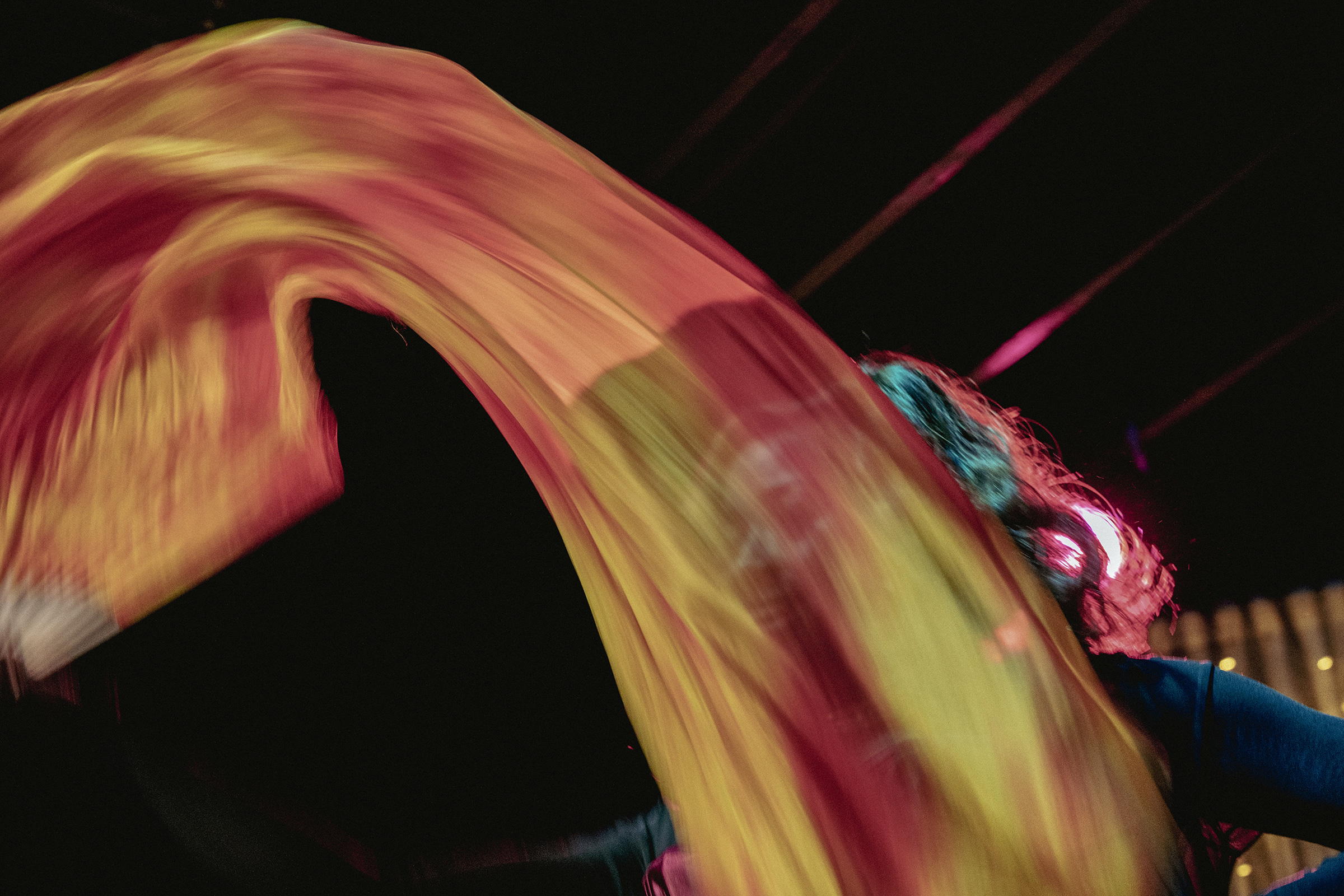
What’s happening in Tennessee and other states is hardly new. In the late 1960s Memphis had an ordinance in place that banned cross-dressing. In protest on Oct. 31, 1969, a group of men organized Memphis’ first public drag performance, a drag pageant held at the Evergreen Theatre. Halloween was regarded as an excuse, says Woolner of the University of Memphis, for masquerade. While no arrests were made, police did park outside the theater, an act of intimidation, according to Ty Phillips, vice president of Friends of George’s, which is based at the Evergreen. And the legal and extralegal harassment didn’t fade away. Men who performed in drag and those who wore what is generally considered women’s clothing took to wearing one item of what is considered male clothing—often underwear. This was sometimes, but not always, enough to evade arrest. Outside gay clubs, private citizens would write down license-plate numbers, then get police help to associate cars with names, Phillips says. Those names went to a local radio station intent on outing people.
In Memphis, the last documented raid at the club known as George’s or The Famous Door occurred in 1971, according to Woolner’s research. Nationally, however, there were still prominent public figures who championed policies to restrict the lives of LGBTQ people, often on the grounds that this was best for America’s children. In particular, they worked to associate gay people with “recruiting,” grooming, and general moral decay. Woolner hears echoes of this in the drag restrictions.
Today, even “people who wouldn’t consider themselves necessarily anti-trans seem to be a little concerned about this, children being around drag queens,” Woolner points out.
I stop by the Evergreen after brunch, about a week before the lawsuit, and find the troupe preparing for Drag Rocks, a variety/comedy/drag show opening April 14. Sandy Kozik, a Friends of George’s board member, described the troupe’s typical show as PG-13. “That’s why the whole claim of protecting children is just weird when some people absolutely want their children exposed to the world, to be comfortable with everybody in it,” he says. The performers have composed their costumes from things in their closets: corsets and fishnets, platinum wigs, leather hot pants and jodhpurs, skirts and military-style jackets, shredded and sequined clothing. Soon, the usual scenes of theater prep begin to unfold: a little backstage chaos, a quiet set, some disagreement about lighting and whether the photographer works best alone. But there is also something else in the 133-seat performance space: a palpable sense of community and a looming sense of what life could become.
“While I see it as a very disturbing moment,” Woolner says, “I also see it generally as a backlash to all of the progress that the queer community has made in the last 50 years. We’ve become so much more visible, especially in popular culture. These new laws seem like they are trying to basically keep queer people out of the public sphere.”
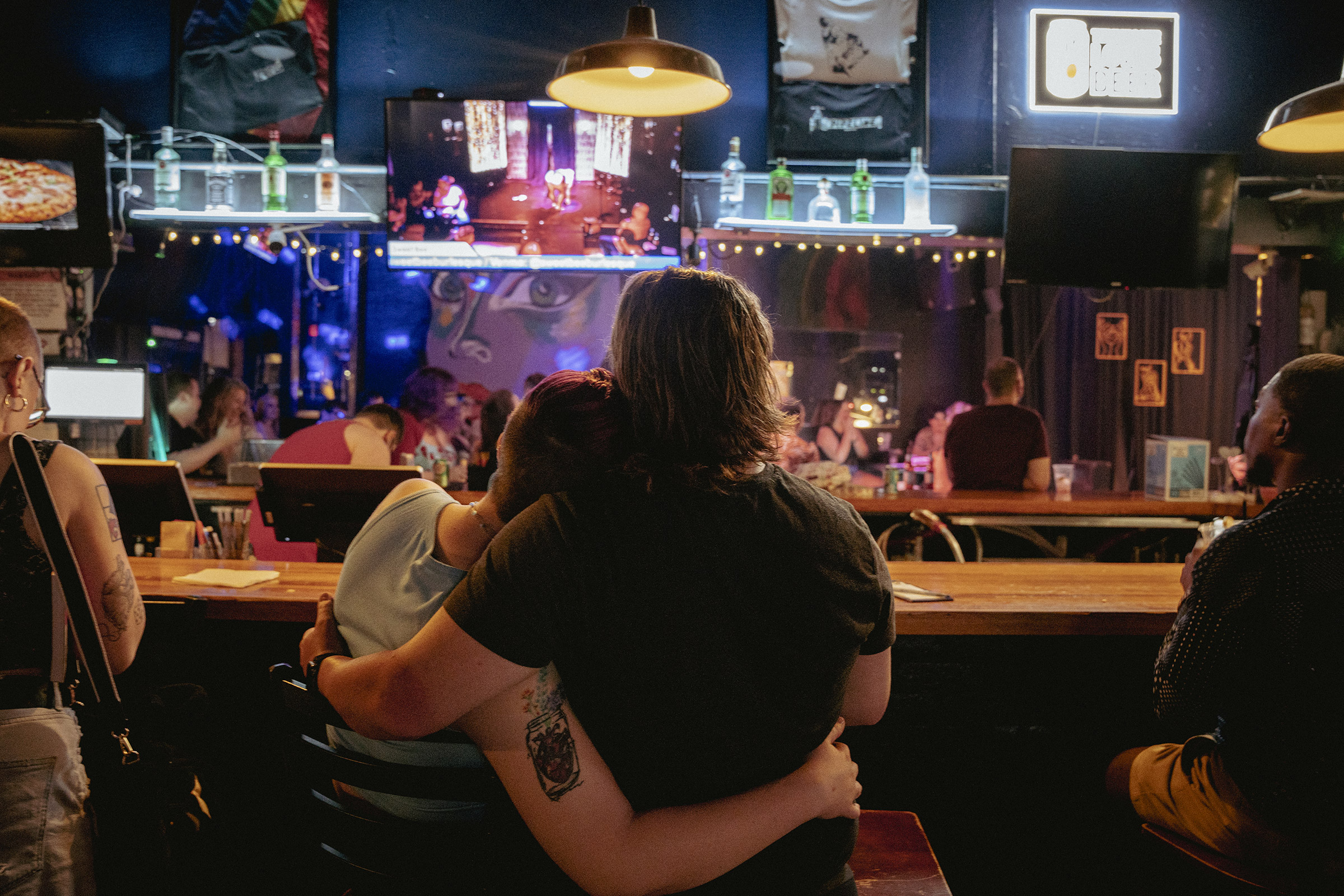
When I reconnect with McDaniel at Dru’s before the 6 p.m. drag show, he’s backstage applying Wood-McDaniel’s eye makeup. But the environment is a little different than the day before. While McDaniel and most of the other performers in Saturday’s show had significant experience and took a meticulous approach to getting into drag, the dressing room full of mostly newcomers—eight of the 13 have been performing for a year or less—feels more chaotic, more crowded, but also more giddy. There are people in that room who are figuring out who they are and in the take-me-or-leave-me-but-I-hope-you-love-me phase of young-adult life. These are also the people that McDaniel and Luella worry about. They wonder how many newbies will give up or be too afraid to ever begin.
A drag king in an AC/DC shirt, Carhart shorts, and backward trucker cap who uses the name Frankie Furter is there as part of a group that came to Dru’s after the restaurant where they had performed in Jonesboro, Ark., effectively halted drag shows when it looked like that state might restrict them.
“I feel like the purest form of myself,” says Furter, a former musical-theater kid. “This is me in my finished form.”
Another performer, Blanca Diamond, tells me her professors at a local art college tried to dissuade her from her planned senior art project about drag, in drag because they thought the law would be in effect by then.
This is Memphis, a drag queen who uses the stage name Magical Miss Mothie, tells me. This is a city that’s always embraced its status as different. You will see people around town in T-shirts that bear phrases like “Memphis as F-ck.” It’s a place that’s long been gritty, creative, unexcited by conformity. That’s also why it’s been a place where great art has been nurtured, Magical Miss Mothie explains.
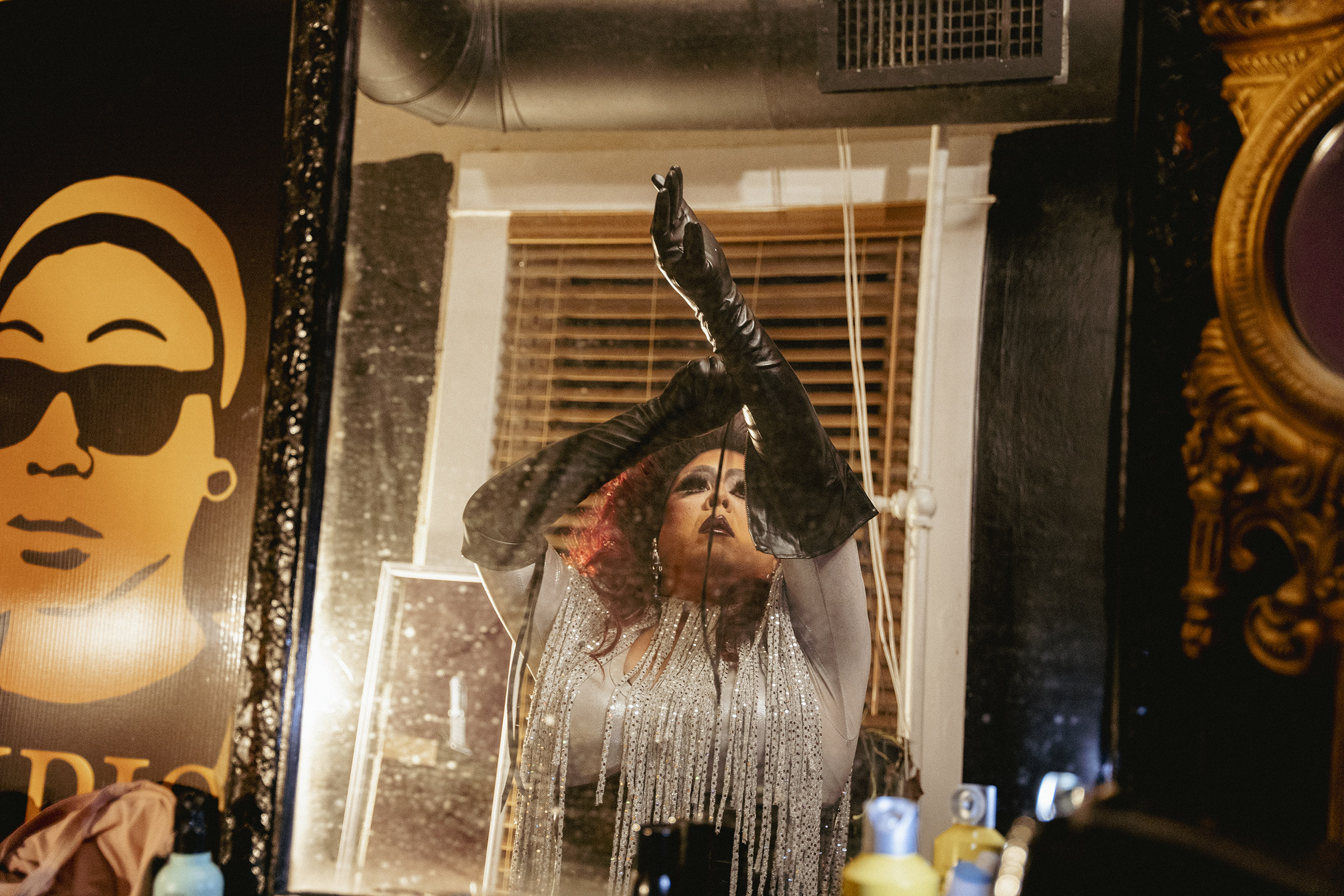
When I leave the dressing room to find McDaniel, he’s seated in the audience at a high-top table with friends. He looks different, somehow small. He’s listening as others around him chat. He also seems to be looking around. Later, he points out that someone failed to turn on the spotlight, making the details of the performer’s faces harder to see. Soon, he’s over by the bar discussing business with staff.
“That’s part of my job. I kind of audit what went right and wrong, what needs to be better or different,” he explains. He’s not as calm as he was onstage, or even behind it applying makeup.
Tonight Dru’s is not full but it’s far from empty. Here, patrons must be 21 and up. The insurance and other costs associated with allowing anyone younger are too high, McDaniel says.
The newcomers show is a little friskier, with a little more innuendo. The moves are a little more suggestive but not obscene. There are jokes, lots of jokes. And the clothing, as always, stays on. It’s part of the performer’s story. The rest, McDaniel thinks, may be a generational thing or part of the process as entertainers find their voices.
Among the performances some of McDaniel’s friends describe as “bold,” and “an unusual choice,” is a number about contemplating suicide, Logic’s “1-800-273-8255.” When the drag queen collects her cash and leaves the stage, Magical Miss Mothie mentions that the performer is moving to Memphis and could use the audience’s support.
It’s in these moments that McDaniel feels sure that not much inside these walls will have to change. There’s just going to be a fight, the kind where you wage war because someone else punched first. But as the show winds down, something has people chattering. Someone has put up billboards in Nashville featuring an image of a person who appears to be Governor Bill Lee in a dress and pearls, part of a high-school tradition that he insists is nothing like drag. Now the billboards are all over social media.
This sets off a round of nostalgia, a conversation which Dru’s owner Tami Montgomery and a patron known by the name Boot join. There was a time that the windows at the front of the bar were covered by plywood, for privacy and security. But when Montgomery bought the bar in 2008, she decided to remove the boards. They suggested there was something shameful inside, she says. Boot and others doubted the decision, wondering if it was safe. But, Boot says, they were proved wrong.
Everyone looks at Montgomery, who gives a sly smirk and a head tilt. The silent “I told you so” reminds me of something McDaniel said the night before: The legislature has underestimated Tennessee, particularly LGBTQ Tennessee and those who love and value the community.
“But more than that,” he said, “they seemed not to have realized that this is not 1903, 1963, or even 2003. There are out and proud people everywhere, in every profession with every skill you can name, who just are not going to be pushed back silently into shame.”
The show—and every other part of the life he’s built—will go on.
—With reporting by Mariah Espada
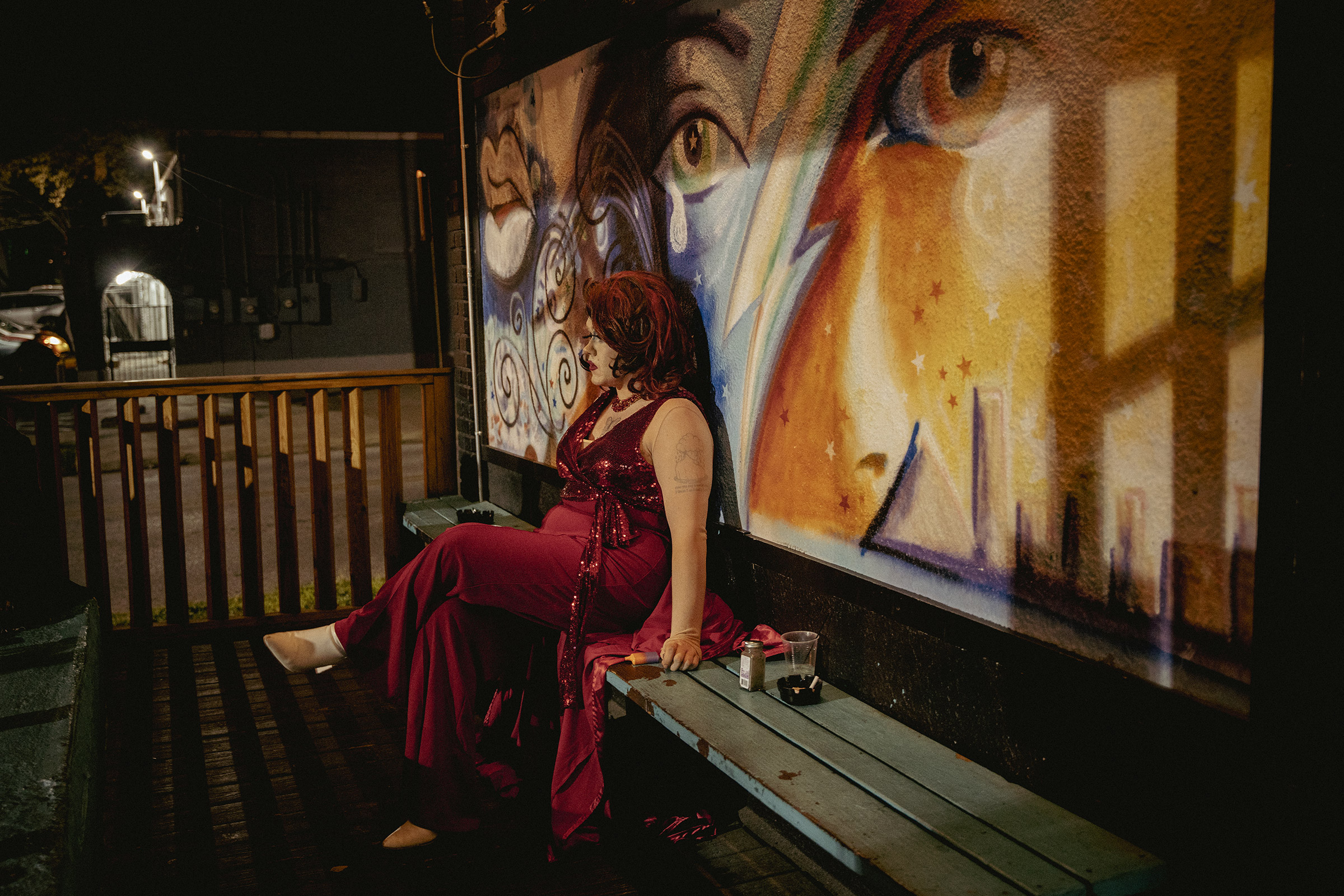
More Must-Reads from TIME
- Why Trump’s Message Worked on Latino Men
- What Trump’s Win Could Mean for Housing
- The 100 Must-Read Books of 2024
- Sleep Doctors Share the 1 Tip That’s Changed Their Lives
- Column: Let’s Bring Back Romance
- What It’s Like to Have Long COVID As a Kid
- FX’s Say Nothing Is the Must-Watch Political Thriller of 2024
- Merle Bombardieri Is Helping People Make the Baby Decision
Contact us at letters@time.com
